Human beings suffer from an identity crisis. Having lost sight of who we truly are, we cover up our true identity with countless things stockpiled from the external world: our name, status, position, educational qualifications, profession… We have constructed a cocoon out of such things and have become lost within it, thinking it is our real abode. We have worn this false identity for so long that we have completely forgotten that it is not our real face.

When ŚrīŚaṅkara, the exponent of AdvaitaVedānta, first approached his guru, ŚrīGovindaBhagavatpāda, the renowned sage asked the eight-year-old Śaṅkara who he was. ŚrīŚaṅkara responded with an extemporaneous six-versed Sanskrit poem, which later came to be known as NirvāṇaṢaṭkam:
mano buddhyahaṅkāracittānināhaṁna ca śrotrajihvena ca ghrāṇa-netre |
na ca vyomabhūmirnatejonavāyuḥcid-ānanda-rūpaḥśivō’ ham śivō’ ham ||
“I am not the mind, nor the intellect, nor the ego, nor the faculty of memory. I am not the faculties of hearing, nor that of tasting, nor the faculties of smelling or seeing. I am not the sky, nor the earth, nor fire, nor wind. I am the ever-pure, blissful consciousness. I am Śiva, I am Śiva.”
If we want to understand who we truly are, then we must look to the wisdom of great souls like ŚrīŚaṅkara and Amma. They don’t have any of our confusions. They know exactly who they are, and their teachings can help us understand who we are as well.
ŚrīŚankara as a child meets his guru, ŚrīGovindaBhagavatpāda, in his ashram on the banks of the Narmada River, as depicted in V.G. Iyer’s 1983 Sanskrit-language film, “Adi Sankaracharya.”
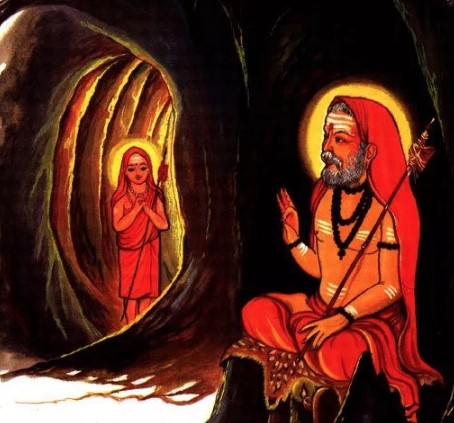
In fact, it is because of our identity crisis that we are beset with fear and tension and aversion in life. In the knowledge of our true divine nature, all such fears vanish, and we are able to live in peace and harmony, regardless of the behavior of others.
In the early 1980s, when Amma’s ashram was just beginning, some of the people in the locality were against Amma. Professed atheists, they didn’t like that Amma’s love and compassion were attracting people from far and wide. In their ignorance, some of them were severely abusive, both verbally and physically.
The village where Amma was born and that is home to Amritapuri Ashram is located on an island. Back then, the only way to reach here was to be ferried by a village pole-boat. One day, we were returning from a devotee’s house with Amma on such a boat when we saw one of the main abusers waiting on the jetty to take our same boat to the mainland. Thinking of his cruel words and actions, I was filled with aversion. As he stepped into the boat, it was obvious that he had a serious infection on both arms. They were oozing pus and blood. Without even thinking, Amma went up to him and lovingly enquired about his wounds. She caressed his arms and even kissed them. She smiled at him deeply and wished him well. Tears welled up in the man’s eyes, as he became overwhelmed with emotion.
That is fearlessness. That is unconditional love.
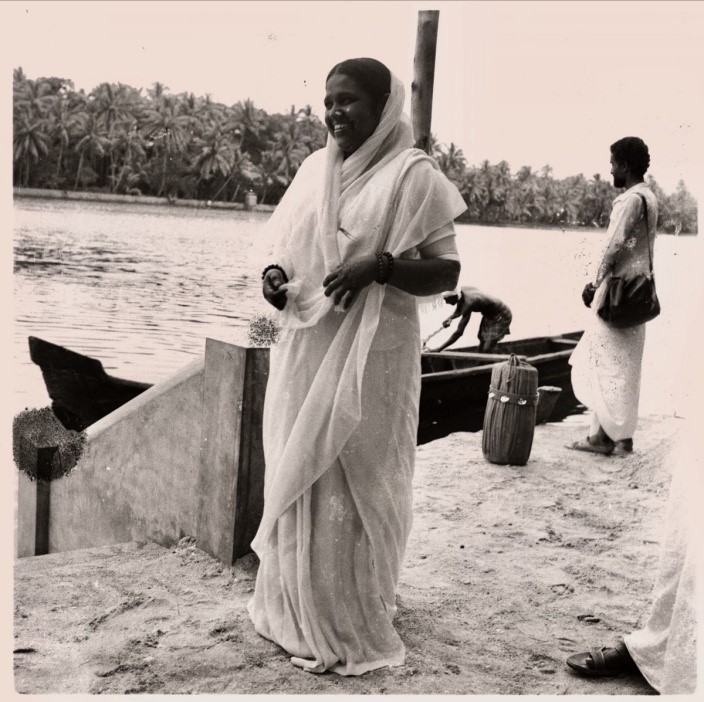
As long as we are identified with our achievements, our name, status, position, and our relationships, we are having an identity crisis. And as long as we remain confused about our true nature, fear will continue to haunt us. Even our love will be gripped by fear. To eliminate this fear, we must embark on a journey — the journey from the body to the soul. This journey, if completed successfully, culminates in total fearlessness. Even fear of death will disappear.
There is a beautiful verse by a 14th century saint from Kashmir named Lalleśvarī that epitomizes the attitude a person of true spiritual attainment has towards death:
O Infinite Consciousness,
brimming with elixir,
You live within my body,
and I worship only You.
I do not care
if I die, take birth,
or pass into some other state.
These things are so ordinary now.
Saints and sages like Amma, Lalleśvarī and ŚrīŚaṅkara tell us that heaven is not something, one should long to reach after death. Heaven is not some luxury beachside resort in the clouds, where comforts and pleasures are available around the clock. Nor is heaven a mere concept. It is a reality that is to be experienced here, while living in this world, and beyond. It is a permanent state of awareness and mental tranquility that destroys every trace of fear. Once established in that awareness, you forever remain in perfect peace and bliss. Even in the death of the body, you are blissful. Death becomes just another event. You can celebrate it wholeheartedly.
Once a mahātmā was asked, “Holy one, are you sure you will go to heaven when you die?”
“Yes, of course,” he said.
“But how do you know?” the man asked. “You are not dead, and you don’t even know what is in God’s mind.”
The mahātmā replied, “It’s true I have no idea what is in God’s mind, but I know my mind. I am always full of peace and bliss wherever I am — even if I were to be in hell itself.”
We have to understand that we are not our name and position in this world; we are the pure consciousness that serves as their substratum. When we can abide in awareness of this truth, fear vanishes. The changing phenomena can and will come and go, but nothing can touch the changeless blissful consciousness that serves as their substratum. As ŚrīKṛṣṇa says in the Bhagavad-Gītā, 2.23-24:
nainaṁ chindanti śastrāṇi nainaṁ dahati pāvakaḥ |
na cainaṁ klēdayantyāpo na śoṣayati mārutaḥ ||
acchedyo’yam adāhyo’yam akledyo’śoṣya eva ca |
nityaḥ sarva-gataḥ sthāṇur acalo’yaṁ sanātanaḥ ||
“Weapons cannot cleave the soul, nor can fire burn it. Water cannot wet it, nor can the wind dry it. The soul is unbreakable and incombustible; it can neither be dampened nor dried. It is eternal, all-pervading, unalterable, immutable and without cause.”
Imagine that you are standing on the roadside watching different vehicles pass by: buses… trucks… cars of various makes and models… limousines… ambulances… perhaps, even a hearse. Standing there, simply take in all those different vehicles. Then, slowly shift your focus to the road. The road is constant, permanent. The road is the eternal substratum upon which all the changing phenomena reside. Even in “bumper-to-bumper” traffic, there is always some small gap through which we can see the road. If we want to become fearless, this is all we need to do. Stop our fixation with the changing thoughts and experiences and shift our focus to the pure awareness that supports them. Move from the changing to the changeless. That is where love is. That is where fearlessness is. That is our true nature.

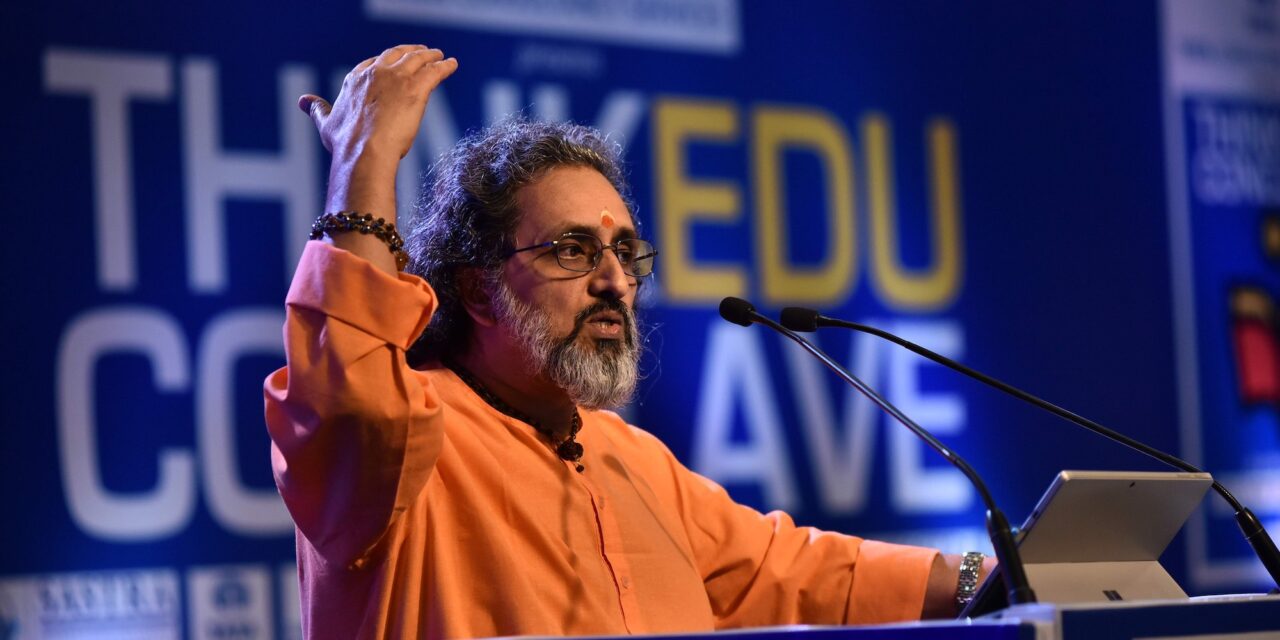
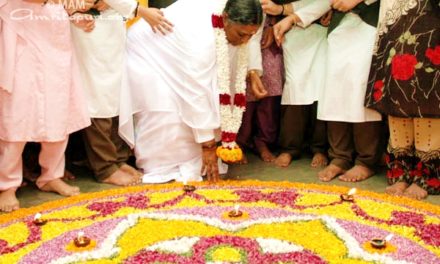
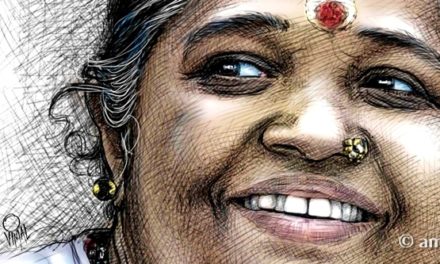

Om Namah Shivayah,
Thank you for reminding us about the true essence of life.
Far away from the Ashram for quite a while now, I have let my fears growing, trying to skip obstacles and control events.
In the moment I read this message I remembered how deep I got absorbed by a chant many years ago.
I learned that chant and sang it to myself many times.
The chant is the poem by Sri Sankara and I had forgotten the whole meaning until today.
I love you Amma. Signs and blessings in disguise are everywhere…
Wonderful… especially love the photo of Amma- thank you!